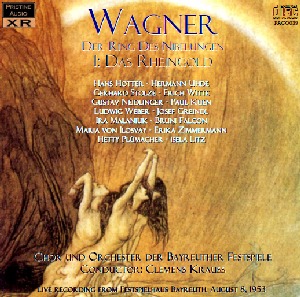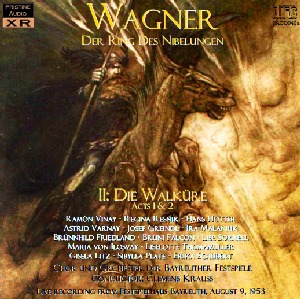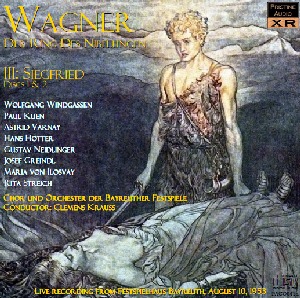 |
 |
|

Availability
CD & Download: Pristine Classical
|
Richard WAGNER (1813 - 1883)
Das Rheingold (1869)
 Choir and Orchestra of the Bayreuth Festival/Clemens Krauss Choir and Orchestra of the Bayreuth Festival/Clemens Krauss
rec. live, in concert, Bayreuth Festival, 8 August 1953
Full cast details at end of review
 PRISTINE AUDIO PACO039 [2 CDs: 145:15] PRISTINE AUDIO PACO039 [2 CDs: 145:15] 
|

Availability
CD & Download: Pristine
Classical
|
Richard WAGNER (1813 -
1883)
Die Walküre (1870)
 Choir and Orchestra of the Bayreuth Festival/Clemens Krauss Choir and Orchestra of the Bayreuth Festival/Clemens Krauss
rec. live, in concert, Bayreuth Festival, 9 August 1953
Full cast details at end of review
 PRISTINE AUDIO PACO040 [3 CDs:
210:55] PRISTINE AUDIO PACO040 [3 CDs:
210:55]  |

Availability
CD & Download: Pristine
Classical
|
Richard
WAGNER (1813
- 1883)
Siegfried (1876)
 Choir and Orchestra of the Bayreuth Festival/Clemens Krauss Choir and Orchestra of the Bayreuth Festival/Clemens Krauss
rec. live, in concert, Bayreuth Festival, 10 August 1953
Full cast details at end of review
 PRISTINE AUDIO PACO041 [4
CDs: 242:11] PRISTINE AUDIO PACO041 [4
CDs: 242:11]  |
|
|
One “Ring” to rule them all? Well; maybe. It’s
a party game for Wagnerians without a winner; the big obstacle
to advocacy of this 1953 live
recording was always the dim, recessed sound of the orchestra. Those for whom
the “Ring” is primarily a music-drama for orchestra and voices have
always balked at the elevation of this set; those who first seek mighty Wagnerian
voices are to some degree blinded by the vocal quality of the stellar cast assembled
here and prepared to forgive those moments, such as when Donner gathers the mists
about him and strikes the rock with his hammer, when the impact of the orchestral
sound is sadly distant.
However, this enterprising remastering by Pristine Audio goes a long way towards
countering those objections and will for many permit this famous cycle to take
its place at the head of a long line, even if it is mono and can never rival
the “Sonicstage” splendours of John Culshaw’s Decca set. Pristine’s
sound engineer Andrew Rose understandably hesitated to undertake the task given
that Opera d’Oro/Allegro had already issued a beautifully packaged bargain
box-set of the whole thing - but this new incarnation leaves it in the dust,
sonically speaking. By comparison, the Opera d’Oro sound is cavernous and
bleary; Pristine have given it much more warmth, presence and definition. The
blare has been reduced and the all-important orchestral detail now emerges more
clearly. This improved sound has the effect of making the orchestra seem to play
better; on previous issues it could sound more like a high school band than the
same orchestra which the year before had been led to the heights in Wieland Wagner’s
new “Tristan und Isolde” under Karajan. There are still moments when
ensemble goes to pot - the “Ride of the Valkyries” is not its finest
hour - but we must remember that this is a live performance, with its pitfalls
and imperfections. It is also worth pointing out that it is not fair to judge
the sound quality of the whole cycle by “Das Rheingold”; although
it’s perfectly listenable. I am sure that by the second night the Decca
sound engineers had worked out better microphone placement and made the appropriate
adjustments to equipment sound-levels based on the experience of the first night’s
recording; there is a noticeable improvement in the sound of “Die Walküre” onwards.
At the time of reviewing, only the first three operas have been released by Pristine
but “Götterdämmerung” must be imminent - and I shall make
sure that I acquire it.
Apart from its inherent virtues, the legendary status of this production was
enhanced by the fact that its conductor, Clemens Krauss, was dead within nine
months. Krauss is today widely reviled for the fact that he is perceived as one
of the worst “Nazi collaborator” conductors - yet he and his wife,
the celebrated soprano Viorica Ursuleac collaborated with the Cook sisters to
smuggle Jews to safety in England. Leaving that aside, Krauss was clearly a skilled
Wagner practitioner who favoured a fleet, forward-moving pulse but also knew
how to give his singers space and to achieve the required stillness in the more
reflective moments of the drama. His approach is light-years away from the sturdy
Kapellmeister grind adopted by such as Knappertsbusch and to my mind far preferable.
My one serious disappointment lies in Krauss’s failure to generate enough
excitement at the end of Act 1 of “Die Walküre” when the explosive
passion of the incestuous twins is uncovered. He is rhythmically too slack here
and cannot emulate the inexorable drive of Bruno Walter in 1935 or Leinsdorf
in his neglected 1961 recording, but elsewhere, in general, Krauss sustains tension
admirably.
The cast is extraordinary; all the more so in an age bereft of Wagner singers.
Vinay’s effortful Siegmund, for all his musicality and burnished tone,
cannot be considered the equal of Walter’s Melchior but he is a fine actor
and has all the notes. Windgassen’s first essay as Siegfried is compromised
by his intermittently bleating tone, some pardonable slips and a characteristic,
infuriating anticipation of the beat in the forging scene. He is no-one’s
youthful ideal as Siegfried, but where is his like today? I admire Regina Resnik’s
impassioned Sieglinde although it has generally been considered a weakness. Astrid
Varnay, while not having the laser intensity of Nilsson, exhibits extraordinary
vocal commitment and stamina as Brünnhilde, some scooping apart. Josef Greindl
assumes three pivotal bass roles as Fafner, Hunding and Hagen, and is far steadier
than was sometimes the case; a proper German “black” bass to chill
the marrow. But for me, and for all the virtues of the other singers, the two
stars of this cycle are Gustav Neidlinger and Hans Hotter.
Neidlinger’s Alberich is a fully-formed assumption: malevolence
and despair incarnate, incredibly steady and incisive. He makes
a formidable adversary to Hotter’s Wotan.
The improved sound allows us to hear the slight wheeze in Hotter’s singing
no doubt attributable to his chronic hay fever, but for the most part the sonority
of his bass his awe-inspiring. I admit that I never “got” Hotter
before listening to this set but my impressions were gained from hearing him
recorded too late in the Solti cycle, when his tone had loosened and become “woofy”.
Here his authority and commanding vocalisation really do conjure up a god - yet
conversely he is humanity and tenderness incarnate in “Der Augen leuchtendes
Paar”; he inflects the text with the heart-breaking intensity of a seasoned
Lieder-singer.
Other famous names from the 1950s feature in even relatively minor supporting
roles. This consistency and strength of casting in combination with Krauss’s
alert direction have always endeared this “Ring” to Wagnerians but
this remastering by Pristine will be instrumental in encouraging a new generation
of “Ring” aficionados previously deterred by the primitive sound
to become acquainted with a great Bayreuth monument. It will not replace Solti
or Karajan for beauty of sound, but it is now the front-runner as a supplement.
Ralph Moore
Full cast lists
Das Rheingold
Wotan - Hans Hotter
Donner - Hermann Uhde
Froh - Gerhard Stolze
Loge - Erich Witte
Alberich - Gustav Neidlinger
Mime - Paul Kuen
Fasolt - Ludwig Weber
Fafner - Josef Greindl
Fricka - Ira Malaniuk
Freia - Bruni Falcon
Erda - Maria von Ilosvay
Woglinde - Erika Zimmermann
Wellgunde - Hetty Plümacher
Flosshilde - Gisela Litz
Die Walküre
Siegmund - Ramón Vinay
Sieglinde - Regina Resnik
Wotan - Hans Hotter
Brünnhilde - Astrid Varnay
Hunding - Josef Greindl
Fricka - Ira Malaniuk
Gerhilde - Brünnhild Friedland
Ortlinde - Bruni Falcon
Waltraute - Lise Sorrell
Schwertleite - Maria von Ilosvay
Helmwige - Liselotte Thomamüller
Siegrune - Gisela Litz
Grimgerde - Sibylla Plate
Rossweisse - Erika Schubert
Siegfried
Siegfried - Wolfgang Windgassen
Mime - Paul Kuen
Brünnhilde - Astrid Varnay
Wanderer - Hans Hotter
Alberich - Gustav Neidlinger
Fafner - Josef Greindl
Erda - Maria von Ilosvay
Waldvogel - Rita Streich
|
|















